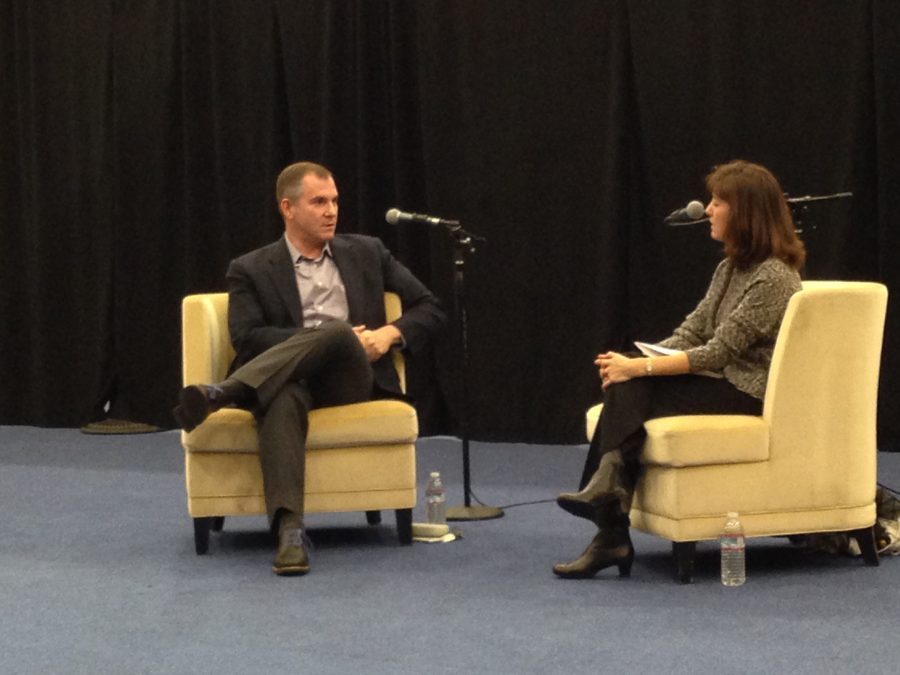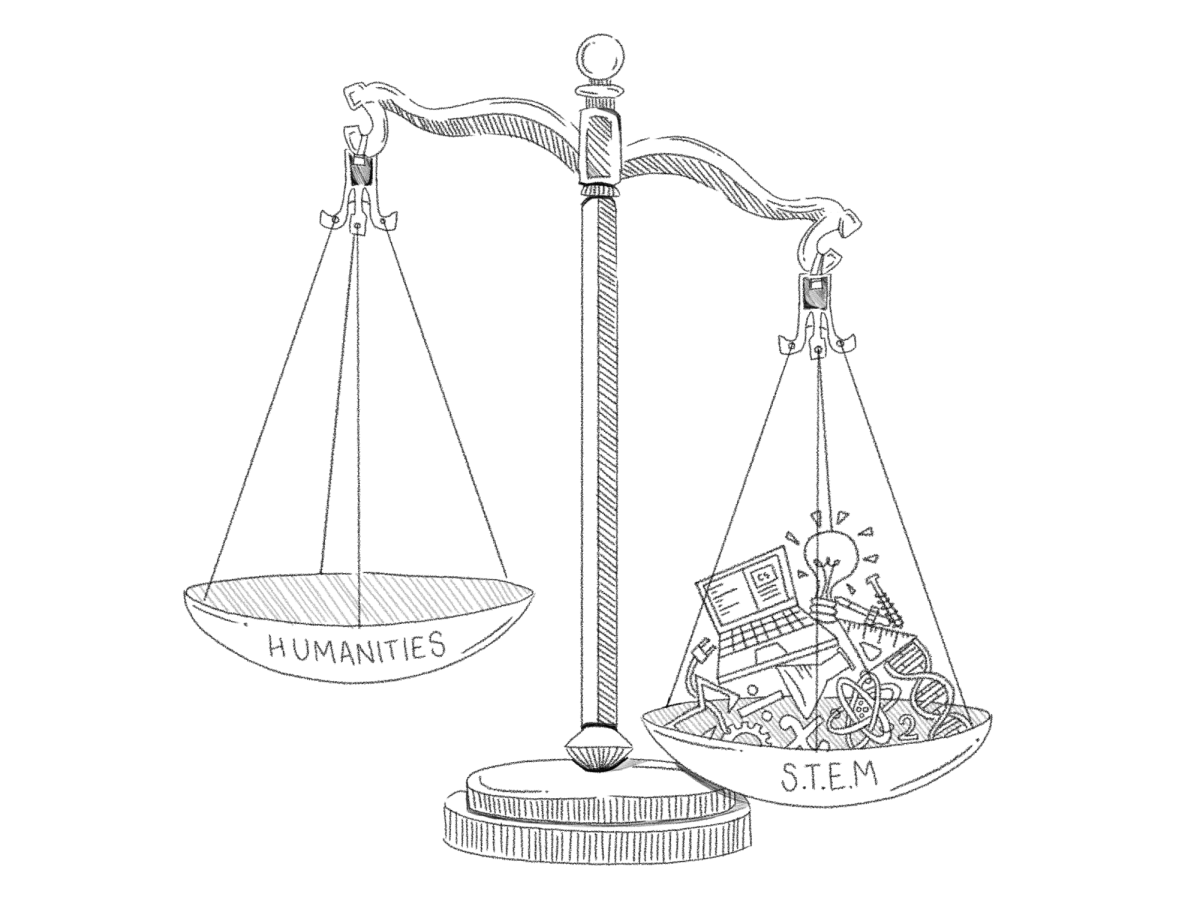Two Coat of Arms editors react to Frank Bruni’s talk at Menlo last night. Staff photo by Davis Rich.
By Davis Rich and Michael Shames
New York Times Op-Ed columnist Frank Bruni came to Menlo Monday night for a conversation with Challenge Success founder and Menlo parent Denise Pope and a Q&A afterwards. Bruni has written extensively about the college process for the Times and is the author of “Where You Go is Not Who You Will Be: An Antidote to the College Admissions Mania.” Senior Paige Pietrofesa, who was particularly touched by Bruni’s book, introduced Bruni to the audience. She detailed her junior-year struggles with the college application process– academics, extracurriculars, and all– and how Bruni’s book helped her gain a greater perspective on higher education.
Pietrofesa is not alone in her struggles to cope with the strenuous college process. Many students at Menlo and other schools alike have felt the burden of fulfilling their potential and being competitive for the elite tier of schools. While Bruni and Pope packed a lot into the hour and a half talk, the central message was clear: the lower an acceptance rate and higher the rank does not mean a better school, and should not dictate where you apply or your level of success. Because of the timing of the event and the lack of lead-up, attendees were mostly parents, but a few students, including us (Davis Rich and Michael Shames) heard Bruni speak. Here are some of our takeaways from the event:
Michael: While I confess to never having read Bruni’s book,– ironically, because my plate has been full with college-related endeavors– I imagine it an in-depth extension on what he and Pope discussed. I plan on reading it once all of this college stuff is sorted out, and I believe other students would benefit from reading it too.
The acceptance rates get into people’s heads. If a school has an acceptance rate of below 10%, it must be a good fit for them. I also think being accepted to one of these schools serves as a form of validation for students. Validation that the hard work and 70 extracurriculars they put into high school made them a viable candidate to this exclusive club. I feel this to a certain extent. I genuinely believe that all 13 or whatever schools I applied to I would be happy at, and some of those schools happened to be in that “upper-echelon” that people talk about. I have also been denied by a few of these schools. Being rejected is not fun, as it feels like the hundreds of hours you put into building your high school resumé isn’t enough, but it is part of the process of applying to college, especially if the list includes highly selective schools.
A lot of people, students and parents alike, feel like it’s Harvard or bust. To Bruni’s point, it’s really not. But a lot of people think it is, and get so caught up in the idea that successful people are successful because of their elite college degree, not what they actually do at that college.
Both Bruni and Pope brought up anecdotes of college students of theirs, at Princeton and Stanford, respectively, who worked extremely hard to get to their top school, only to slack off when they were there. It’s not that these students were especially lazy, but rather the larger culture surrounding college. High school students think the end goal is to get to that 10% acceptance rate, top-ten US News school and you’ll all of a sudden turn into a successful human. In reality that’s not the goal at all. Instead, the goal really is taking advantage of the resources your college has to offer and using it to develop into a successful human. And through the research that both Bruni and Pope studied, these magical resources aren’t limited to the colleges with the lowest acceptance rate, but rather are offered by a vast range of schools. Where you go is not who you’ll be. It’s a message that high school students hear a lot, and many students kind of laugh it off as a contrived statement that adults say. But it’s true. I hadn’t really thought much about it, but Bruni and Pope really convinced me, and I hope other students– especially those struggling with the college madness– genuinely hear that message.
Davis: After attending Frank Bruni’s talk with Challenge Success’ Denise Pope and subsequent Q&A, I came away with two reactions. The cynical part of me saw an audience that was 85% parents of students at Menlo and Sacred Heart listening to two well-researched, articulate professionals tell them very logically to stop worry where their kids will end up at the end of high school, then walking out the door, going home, and badgering their kids about SAT prep on Tuesday night or their private college counseling meeting on Thursday. College admissions is, as Bruni put it on Monday night, an arms race— parents aren’t going to stop trying to get their kids an advantage out of the goodness of their hearts. Rightfully, they want the best for their kids and are willing to keep upping the ante so to speak (more AP classes, more hours of test prep, tutoring at an earlier age) if they see their parental counterparts doing the same.
I would have also liked to see more discussion around some of the more fundamental inequities in the college admissions process because the ways in which students at Menlo and Sacred Heart benefit from the wealth of resources we have are the same ways that underprivileged students suffer and are often looked over or missed completely in the college process. There was a very large assumption, given the audience, that everyone in the crowd either was or had a kid who was applying or capable of applying to an elite institution, which is simply not the case in any other part of the world.
The more optimistic side of me saw a group of parents that seemed energized and understanding by Bruni’s words, clapping and affirming his statements several times. From my perspective, the parents at the talk recognized Bruni’s major points— that it doesn’t matter where you go so much as what you do when you get there, that being genuine is more important that being a box-checker, that colleges utilize extensive marketing schemes to drive down acceptance rates— and were curious about how to change the culture. Clearly, there was some selection bias involved, as the parents at the talk only came because they had heard of Bruni and his work before, and the parents who spoke up during the Q&A portion were confident enough to express their (mainly affirming) viewpoints.
However, the fact that Bruni offered a solution, and a feasible one, to the problem of college admissions craziness undoubtedly left attendees of the event with an idea of what they can individually do to change the culture (Bruni suggested that students and parents stop equating low acceptance rates with elite educations and refuse to continue to solicit and perpetuate a culture in which colleges can make themselves appear more academic appealing without actually improving their academics). The upshot is that more earnest parents will hopefully begin using Bruni’s strategies to disarm the college admissions race before acceptance rates get even lower and student anxiety levels get even higher.








